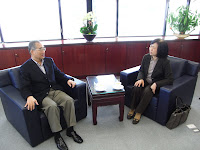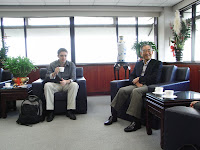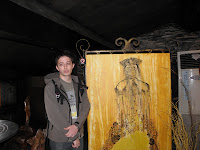On monday afternoon, right after lunch, Conservation Mother's Foundation welcomed reporters, for an impromptu press conference in the "Youth Hotel Taipei" at Taipei! I was not present.
On voit bien Madame Chou être interviewer par plusieurs journalistes, dont les plus grandes chaînes d'informations national du pays.
We can observe Mrs. Chou being interviewed by several reporters, and among them the biggest national news channels of the country.
Et me voici, après la conférence de presse de madame Chou au nom de la fondation Conservation Mother's Foundation, devant le quartier général de l'Administration de Protection de l'Environnemen (EPA). Le ministre de l'environnement, Stephen Shu-hung Shen, a gentillement accepté de prendre une heure de son temps pour répondre à quelques questions, sur la politique environnemental du gouvernement depuis la création de cette administration en 1987. Ce fut très instructif, une conversation franche et directe. .
And here I am, after Mrs. Chou's press conference in the name of Conservation Mother's Foundation, in front of the headquarter of the Environmental Protection Administration (EPA). The minister of the environment, Stephen Shu-hung Shen, has kindly aggreed to take an hour of his precious time to answer some of my questions, about the environmental policy of the gouvernement since the inception of the administration in 1987. It was very informative, a franck and direct conversation.

Here I am in front of the headquarter of the Environmental Protection Administration (EPA).



 Avant d'être ministre de l'environnement, il était délégué de l'administration EPA en charge de la ville de Taipei. C'est lui qui mit en place la nouvelle politique de traitement des déchets dans la ville, et elle existe toujours aujourd'hui.
Avant d'être ministre de l'environnement, il était délégué de l'administration EPA en charge de la ville de Taipei. C'est lui qui mit en place la nouvelle politique de traitement des déchets dans la ville, et elle existe toujours aujourd'hui. 

Le ministre de l'environnement et moi-même.The minister of EPA and myself.

This is the group that I went to see the minister with, all members of the foundation . We can recognize Mrs. Chou (4th person from the left), and the minister (5th person from the left, beside Mrs. Chou), and me on the extrem left.











 Durant notre interview, il m'expliqua notamment que suite au boom économique de Taiwan à la fin des années 60, les déchets s'accumulaient, et personnes de savaient quoi en faire!
Durant notre interview, il m'expliqua notamment que suite au boom économique de Taiwan à la fin des années 60, les déchets s'accumulaient, et personnes de savaient quoi en faire!




































